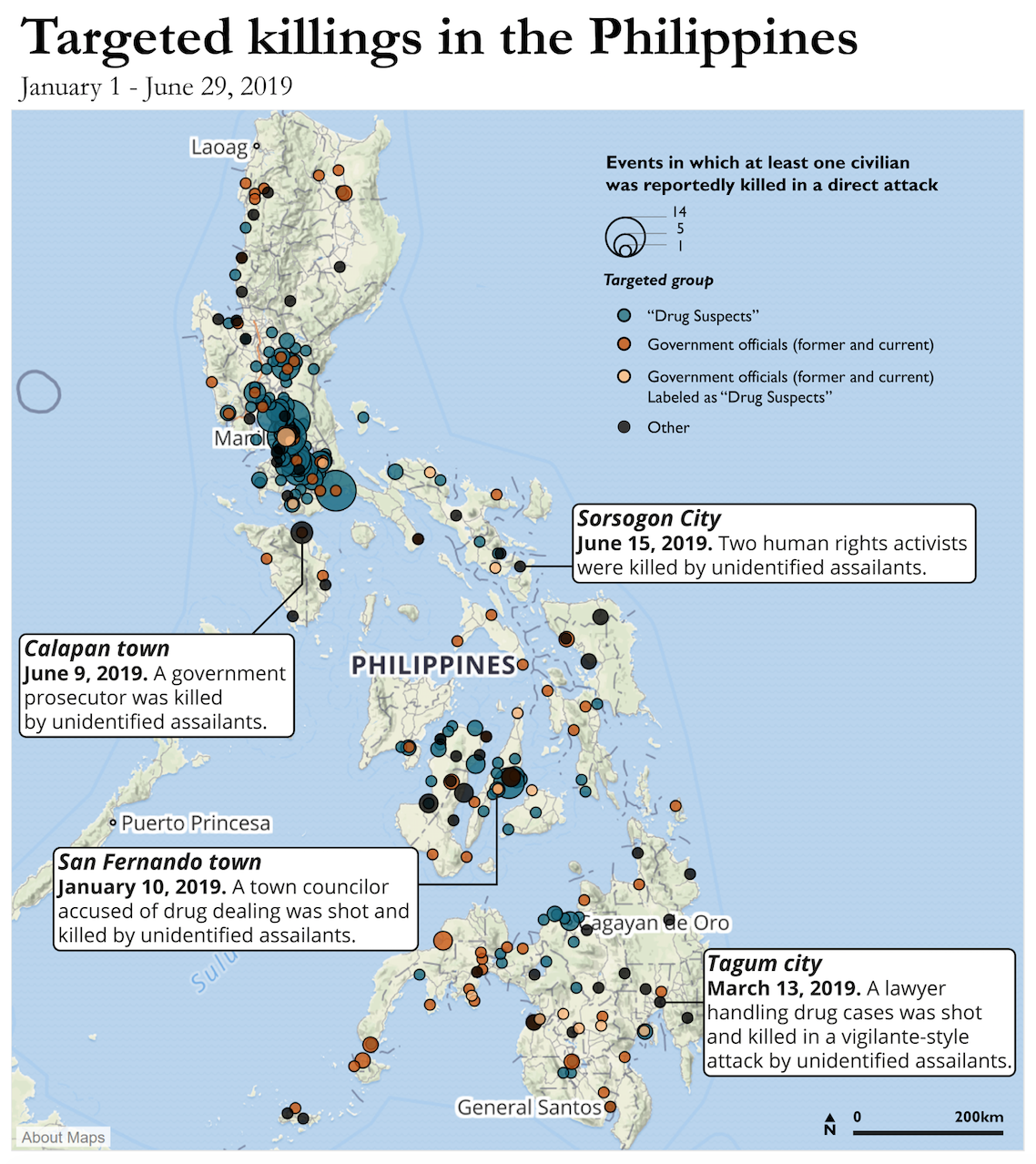3 July 2019: Violence against civilians has continued unabated in the Philippines through the first half of 2019, prompting condemnation last week from the UN High Commissioner for Human Rights over the “extraordinarily high number of deaths – and persistent reports of extrajudicial killings.” The Philippines remains one of the most dangerous places in the world for civilians, and new analysis by the Armed Conflict Location & Event Data Project (ACLED) confirms that a wave of targeted attacks has resulted in the reported deaths of nearly 490 civilians since the start of the year.
President Rodrigo Duterte’s ‘War on Drugs’ has driven this violence, with alleged drug suspects accounting for almost 75% of this year’s civilian deaths. In addition to operations against ‘drug suspects’, political rivalries drive anti-civilian violence in the country as well: after drug suspects, government officials have been the second most targeted civilian group in 2019, often targeted by their political rivals. Sometimes these two categories can be one and the same, as opponents of the Duterte administration are routinely accused of involvement in the drug trade — and are subsequently targeted.
Anti-Civilian Violence
- ACLED has recorded over 450 direct attacks targeting civilians resulting in nearly 490 reported fatalities since the start of 2019
- So far this year, lethal attacks are concentrated in the Central Luzon and Calabarzon regions, accounting for 23% and 22% of reported civilian fatalities, respectively
- Approximately 10% of reported fatalities from civilian targeting have been recorded in the National Capital Region, which includes Manila
- State forces are responsible for nearly 60% of all civilian targeting events in 2019 to date, followed by unidentified or anonymous armed groups at 27% and anti-drug ‘vigilantes’ at 8% — though these latter groups may in fact be linked to the state
- More than half of all political violence in the Philippines each year since 2016 has consisted of violence against civilians, corresponding to when President Duterte assumed office
- Over two-thirds of all political violence in the Philippines in 2019 thus far has consisted of violence against civilians
Targeted Attacks
- ‘Drug suspects’ account for almost 75% of all reported fatalities from civilian targeting so far this year (approximately 360 recorded killings); state forces have been the primary perpetrators of these attacks. Former and current government officials account for approximately 18% of reported fatalities (approximately 90 recorded killings); these victims tend to be targeted by unidentified or anonymous armed groups that are often linked to their political rivals
- These figures include 20 former or current government officials that were labeled as drug suspects, and as such, falling into both of the categories above
- The number of targeted attacks spiked around the midterm elections in May of this year, due to an increase in events targeting government officials at the hands of their political rivals
- Drug suspects and government officials are not the only targets of anti-civilian violence: members of political parties, leftist organizations, land activists, farmers, lawyers, and judges have all faced targeted attacks in 2019
A US-based 501c3 established in 2014, ACLED is the highest quality, most widely used, real-time data and analysis source on political violence and protest around the world.
If you would like to use ACLED analysis or visuals, please review our Terms of Use and Attribution Policy.
For an explanation of ACLED’s methodology for collecting data on drug-related violence in the Philippines, click here.
For interview requests and press inquiries, please contact:
Sam Jones
Communications Manager, [email protected]
___________
Download a PDF of this press release here.
___________





